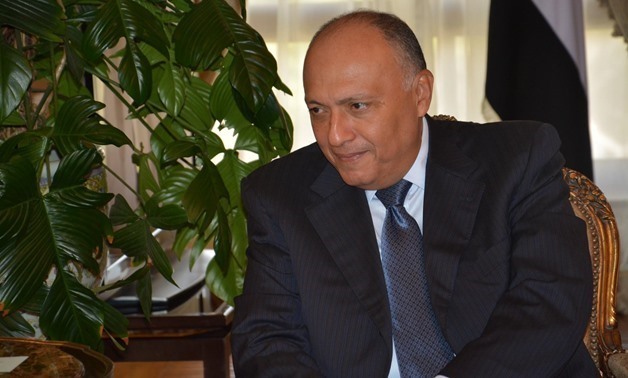
Egypt’s Foreign Minister Sameh Shoukry – press photo
CAIRO – 29 June 2018: Egypt’s Foreign Minister Sameh Shoukry met on Thursday his Burundian counterpart Ezechiel Nibigira on the sidelines of the 33rd Ordinary Session of the Executive Council of the African Union.
Shoukry arrived earlier in the Mauritanian capital, Nouakchott, where he was received by Egyptian ambassador to Mauritania, Maged Nafea. He took part in the 33rd ordinary session of the African Union’s executive council later in the day ahead of the 31st AU summit that will kick off on Sunday.
Nibigira expressed his appreciation for his Egyptian counterpart’s recent visit to Bujumbura, capital of Burundi, asserting his intention to visit Egypt as soon as possible out of his keenness to activate cooperation between the two countries.
He also stressed his country's commitment to its position on the necessity of achieving consensus among the Nile Basin countries, pointing out that his country understands Egypt's rights of Nile water and its importance as the main water supply for the country.
Egypt depends entirely on Nile water for drinking and irrigation purposes, reiterating consistently its "historical right" to the river guaranteed in the 1929 and 1959 Nile agreements, which granted the country 87 percent of Nile water and the right to veto or approve irrigation projects in the upstream countries.
Egypt’s average water per-capita is expected to drop from 663 cubic meters per year to 582 cubic meters by 2025, according to the Central Agency for Public Mobilization and Statistics (CAPMAS). Addis Ababa, however, claimed that the dam is necessary for Ethiopia’s development and will not harm downstream countries.
In 2011, Ethiopia started the construction of the 6,000-megawatt Renaissance Dam over the Blue Nile River, one of the major sources of water that forms the Nile River downstream. Concerns have risen in Cairo and Khartoum over the negative impact the Ethiopian dam will have on their historic Nile water share, amounting to 55.5 billion cubic meters in Egypt only, in accordance with the historic 1959 agreement with Sudan.
Egypt fears the dam project will reduce its share from the water that run to its fields from the Nile reservoirs in Ethiopia’s highlands.
Comments
Leave a Comment